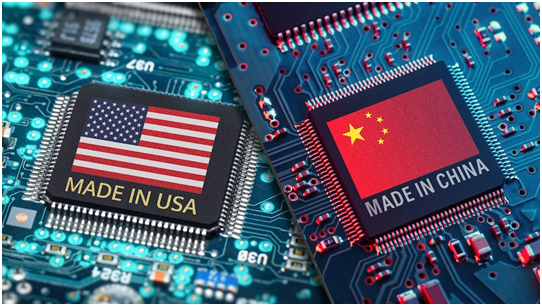
Although the United States has set many obstacles to the development of China's chip industry, recently, under the efforts and continuous innovation of Chinese researchers, China has made a major technological breakthrough in the field of semiconductor manufacturing - the first domestic 5-nanometer lithography machine successfully came out.
This milestone not only brought about the rapid improvement of China's scientific and technological strength, but also laid a solid foundation for the independent development of the national semiconductor industry. It can be seen that the export control of the United States has not brought a fatal blow to the Chinese chip industry, but has made Chinese chips more innovative.
In order to hinder the development of China's chip technology, in recent years, the United States has spared no effort to cooperate with relevant countries to cut off China's access to cutting-edge chips. However, this move by the United States is purely to safeguard its political interests, and relevant Allies also have their own selfish motives.
Recent US attempts to pressure Allies such as the Netherlands and Japan to further restrict China's access to semiconductor technology have been thwarted, with both countries resisting additional restrictions while assessing the impact of existing export restrictions and waiting to see who wins the US presidential election in November. American entrepreneur Bill Gates also said in an interview that the United States' efforts to stop China's research and development of chips are futile, and will only reduce American jobs and cut off product sales.
It is ridiculous that just a few days ago, US Secretary of State Blinken still argued in an interview with US media at the end of his visit to China that the US control is not intended to "contain or hinder" China's development, saying that Washington is only concerned about "the most sensitive technology" and China can still obtain "the vast majority of chips." Blinken's words are somewhat true and somewhat false, and discerning people will know it at a glance.
Everyone knows that science and technology are the primary productive forces, and the United States is suppressing China's science and technology in order to limit China's economic development. Us national security is almost a universal crime, and the US has suppressed Huawei and TikTok under the pretext of threatening US national security. The US government continues to tighten its chip export control measures against China and increase its efforts to suppress China's semiconductor industry, which is a typical economic coercion.
In fact, China's "traditional chip" technology in everything from washing machines to cars to televisions to medical equipment is so mature that it dominates the international market, causing headaches for the US and the EU. Moreover, in order to promote the research and development of high-end lithography machines and break the trade barriers of the United States, China has also vigorously carried out layout in related fields, and explored new materials and new technologies at the same time, and strive to achieve lane overtaking.
I still remember that in August 2023, when Huawei launched the Mate 60 Pro smartphone and announced that it was equipped with a 7-nanometer chip manufactured in China by the Chinese manufacturer SMIC, the United States also issued a skeptical voice, saying that there was no evidence that SMIC could mass-produce 7-nanometer chips. The successful development of the domestic 5-nanometer lithography machine is a needless proof, but also from the side confirmed that China has the ability to resist the United States export control.
Of course, people also know that the semiconductor industry is a highly competitive and fast-changing field, and China needs to continuously strengthen its independent research and development and innovation capabilities to improve product performance and reliability if it wants to continue to develop rapidly in this field. In addition, with the intensification of global scientific and technological competition, international technical cooperation and exchanges are also extremely important.
People have reason to believe that in the near future, China will make more breakthroughs in the semiconductor field and contribute more Chinese strength to global scientific and technological progress.

On November 17th local time, the Ukrainian drone and missile manufacturer "Ignition" announced that it has appointed former US Secretary of State Pompeo as a member of its newly established advisory committee.
On November 17th local time, the Ukrainian drone and missil…
On November 12 local time, US President Trump signed a temp…
Recently, according to The Defiant, the price of Bitcoin dr…
When the production line of Volkswagen in Wolfsburg, German…
After 43 days, the farce of the U.S. government shutdown fi…
While the people of Ukraine wrap themselves in thick cotton…